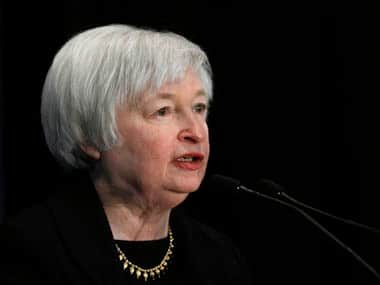New York: US President Barack Obama formally tapped Janet Yellen on Wednesday to succeed Ben Bernanke as the next chairman of the US Federal Reserve, arguably the most important job in global finance, in a move that was bullish for stocks.
If approved by the Senate, Yellen, 67, would be the first woman to head the world’s most influential central bank in its 100-year history. Yellen, an advocate for aggressive stimulus, would succeed Bernanke, who is set to step down on 31 January.
[caption id=“attachment_1163693” align=“alignleft” width=“380”]  A file photo of Federal Reserve Vice Chair Janet Yellen. Reuters[/caption]
Yellen’s nomination was greeted with joy by the markets which see her as supportive of Bernanke’s easy-money policies. She represents continuation at a time when there is a sudden sense of drift at the top of the world’s largest economy thanks to political dysfunction in Washington.
Yellen is one of the architects of the Fed’s bond-buying program and is considered unlikely to wind it down too soon or abruptly.
According to The Washington Post, Yellen is perhaps the “most qualified Fed chair in history.” She has served for three years as vice chair of the Fed, headed up the San Francisco Fed for six years, run the Council of Economic Advisers, and done a stint on the Fed Board of Governors.
“Janet is exceptionally well qualified for this role,” Obama said, praising Yellen for “sounding the alarm early” about the housing bubble and the recession.
“She doesn’t have a crystal ball, but what she does have is a keen understanding about how markets and the economy work, not just in theory but also in the real world. And she calls it like she sees it,” Obama said while announcing Yellen’s nomination from the White House.
Impact Shorts
More ShortsYellen’s predictive record is the envy of the Fed. She was one of the few governors at the Fed in December 2007 warning that recession could be around the corner. She told fellow Fed leaders: “The possibilities of a credit crunch developing and of the economy slipping into a recession seem all too real.”
The nomination ends a long and bitter public debate about Obama’s choice for Fed chairman. Yellen’s nomination was widely expected, but she was not Obama’s first choice for the job. Obama turned to Yellen after his former economic adviser Lawrence Summers dropped out of the running on 15 September in the face of fierce opposition from Democratic senators, raising questions about his chances of Congressional confirmation.
Yellen seen as staunchly pro-stimulus
Yellen’s nomination means the Fed is unlikely to make any unusual lurches in its easy-money policies in the near term. As vice chair of the Fed for the past three years, Yellen worked closely with Bernanke in building support for stimulus to spark the economy and bring down unemployment. As one of the architects of the Fed’s bond-buying program Yellen is unlikely to wind it down too soon.
“If anything, Ms Yellen has wanted the Fed to take even more aggressive measures to lift growth, believing the risks of inflation are modest. But her views and Mr Bernanke’s appear close enough that markets have considered her potential ascension a sign of continuity at the Fed,” said The New York Times.
Wall Street recovered from steep losses earlier on Wednesday on market relief that Obama had tapped Yellen to head the Fed. The Dow Jones industrial average rose 0.18 percent to 14,802.98.
Expectations that the Fed might start to taper its stimulus program have been a concern for the world since May. The central bank shocked investors in September by maintaining its cash injections of $85 billion a month in full. The Fed’s decision last month not to reduce stimulus was a “relatively close call” for policymakers, according to minutes of the meeting that suggested there was still support to trim bond-buying this year.
Yellen would oversee the difficult task of unwinding the extraordinary stimulus designed by the bank after the economic downturn in 2008. But she is likely to embrace gradualism when it comes to tapering.
Yellen’s nomination comes as fiscal and budget fights between the Republicans and Democrats have led the government to shut down for more than a week and as the US approaches its debt ceiling on 17 October. It’s unclear when Yellen’s confirmation hearings would begin, but with the broader fiscal fights continuing she’ll likely face tough questions from Republicans.
The Brooklyn born economist was appointed vice-chair of the Fed in October 2010. An expert on the job markets, Yellen has been a staunch ally of Bernanke as he has tried to use low interest rates and stimulus to reanimate the US’s still-lackluster job market.
Yellen met her husband, George Akerlof, at the London School of Economics. Akerlof, who won the Nobel Prize in economics in 2001, wrote in his biographical note: “Not only did our personalities mesh perfectly, but we have also always been in all but perfect agreement about macroeconomics.”


)

)
)
)
)
)
)
)
)



